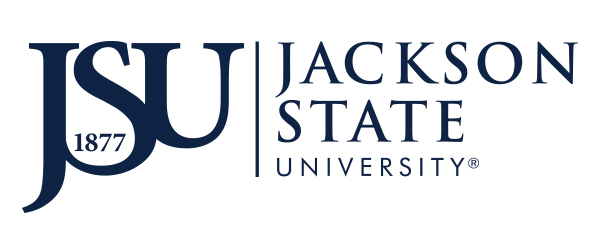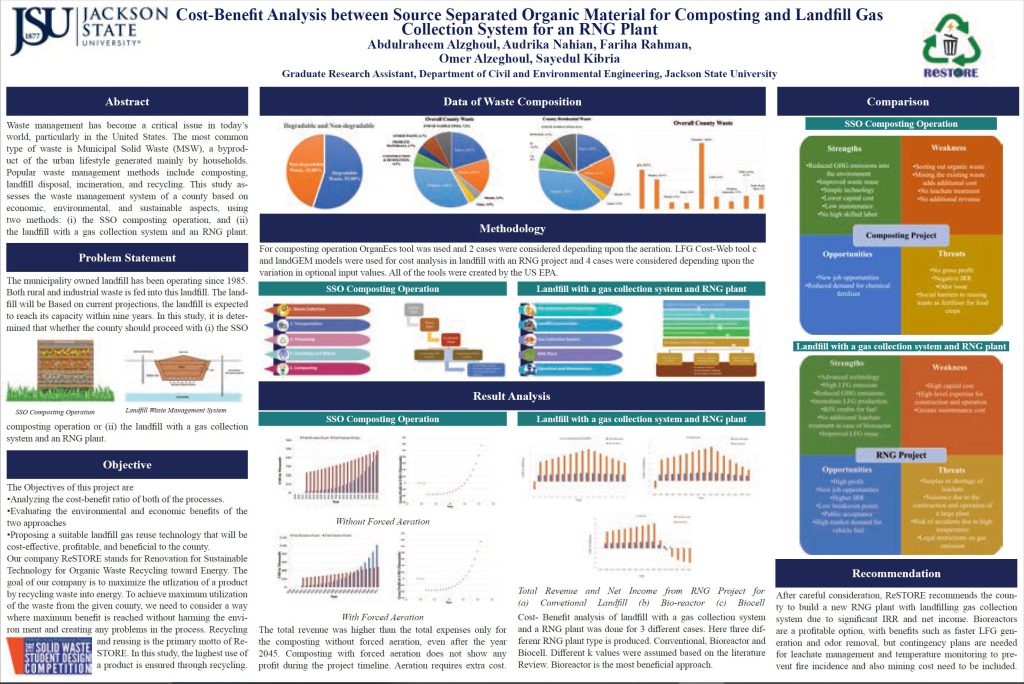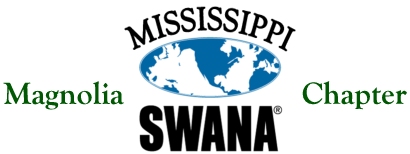Congratulations once again goes to Jackson State University’s College of Science, Engineering, and Technology for placing in their second straight SWANA International Solid Waste Design Competition (SWDC). They have now placed in back-to-back years and pulled out a 3rd place win in the 2023 competition.
The SWDC is a student team competition to solve “real world” problems faced by solid waste professionals. The competition aims at providing design experience to the students interested in pursuing an education and/or career in solid waste management. The program encourages student involvement in SWANA, provides students real world experience in solving complex solid waste management issues in a supportive and fun environment, provides students an opportunity to display their talents, and provides a networking opportunity for students to connect with potential employers.


This year’s competition focused on the Problem Statement: Cost-Benefit Analysis of Using Source-Separated Organic Material in a Compost Operation versus Utilizing Landfilling Organics at a Site with a Landfill Gas Collection System and a Renewable Natural Gas (RNG) plant. The US EPA has long encouraged owners of municipal solid waste landfills to consider utilizing the biogas generated from landfills for waste to energy projects. Organic wastes such as food waste largely contribute to the generation of this gas. In the state of Mississippi, there are 5 active landfill gas to energy (LFGTE) projects allowing for the use of LFG to generate electricity, to be used directly in boilers and other fuel burning activities, and for cleaning to create a high quality pipeline grade gas or renewable natural gas (RNG). LFGTE projects face major economic barriers in capital/operating costs, and the cost of infrastructure required to get the gas to the customer.
In alternative to the landfilling of such organic wastes, several local governments across the US have implemented organic waste source separation and diversion programs for management via digestion or composting processes, both of which offer environmental benefits like LFGTE projects. Not without its own barriers, composting can suffer from lack of community involvement, education, and proper outreach as well as finances.
The goal of this year’s competition was for teams to compare the cost-benefit of two organics management systems: 1) use of source separated organics in composting operations, and 2) landfilling organics for the purposes of collecting and processing LFG to create high quality RNG. This year’s teams included representatives from the following universities:
- University of Florida
- University of Texas at Arlington
- University of Ottawa
- Jackson State University
- Florida Atlantic University
JSU became the first MS university to participate in the national competition last year and decided to compete again this year for the 2nd year in a row. JSU’s team consisted of graduate research students and MS SWANA student members Fariha Rahman (team lead), Abdulraheem Alzghoul, Omer Alzeghoul, Audrika Nahian and Sayedul Kibria with advising faculty Associate Professor Mohammad Sadik Khan, Ph.D, P.E. within the Civil and Environmental Engineering Programs. The team ran analyses for a composting operation assuming both the use of forced aeration and more passive aeration. They also ran analyses for operation of an RNG plant using LFG generated from both conventional “dry tomb” landfills and bioreactor/biocell landfills. Based on their research, assumptions, and calculations, the JSU team determined that while a better cost-benefit was realized with a composting operation that didn’t use forced aeration, ultimately the best cost-benefit was realized in the scenario where LFG was captured for processing at an RNG plant.
You can view a recording of their presentation HERE.
On behalf of the Chapter Board of Directors and our proud Chapter members and associates, congratulations to Dr. Khan, Fariha, Abdulraheem, Omer, Audrika, and Sayedul on their hard work, performance, and placing in this year’s competition. We are looking forward to hearing about this competition experience at the upcoming 2023 Fall MS SWANA conference. The Board also congratulates the other teams for their participation and efforts and particularly the 1st and 2nd place teams from the University of Florida and University of Texas Arlington, respectively.


Leave A Comment